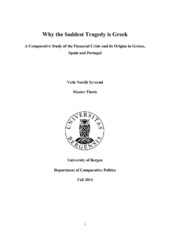Why the saddest tragedy is Greek: A comparative study of the financial crisis and its origins in Greece, Spain and Portugal
Master thesis
Permanent lenke
https://hdl.handle.net/1956/9151Utgivelsesdato
2014-11-20Metadata
Vis full innførselSamlinger
Sammendrag
This thesis explores the financial crisis in Greece, Spain and Portugal in the period of 2007-2012, with the goal of uncovering which explanatory variables that are crucial for determining the level of severity of crisis in these cases. The purpose is to test the perception of these countries as the most severe cases of the European financial crisis, and provide in-depth within case insights that could help explaining this expected outcome. Furthermore, the case selection is also based on the expectation that Greece has experienced the significantly most severe level of crisis, despite sharing a wide range of similarities with Greece and Portugal. This is mainly based on markedly larger support packages issued to Greece by the euro zone after the occurrence of the crisis. I therefore apply a comparative-historical case study with a most similar systems design (MSSD), to identify the explanatory variable(s) that could explain this expected different outcome. The definition of the dependent variable severity of crisis is based on Reinhart and Rogoff's (2009) classification of four main subtypes of crises, banking, currency, debt, and inflation crises, and the frequency and depth of the occurrences of these. The set of explanatory variables is based on Greece, Spain and Portugal's challenges in the aftermath of the fall of their respective authoritarian regimes around 1975, and the development of their political system and economy up to 2012. The data sources applied are an extensive selection of qualitatively analyzed descriptive statistics, which included the values of the EU average as a reference point, and secondary literature. The results of the analysis showed that Greece stood out as the most severe case of crisis. Portugal experienced a substantially more severe crisis than the EU average, while Spain experienced a level of severity closer to the EU average but still noticeably more severe. The variable where Greece showed the clearest deviation from Portugal and Spain, was their lower level of central bank independence. The Greek government's actively inflating monetary policies throughout the 1980s had a deteriorating effect on the level of sovereign debt, a trend that was reversed at an earlier stage in Spain and Portugal. The findings of this thesis could contribute to future research, by providing a set of explanatory variables that could be expanded further. Also, my measure of severity of crisis could serve as a useful foundation for developing a measure of this phenomenon suitable for quantitative analysis.
